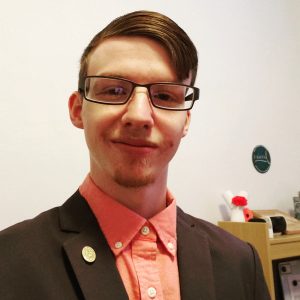Randolph students help with COVID-19 data collection

Mikayla Jenkins ’23, above, and Brandon Kaiser ’21, below, both worked as virtual interns with Broadstreet, collecting COVID-19 data, last semester.
Two Randolph students were recently able to contribute their skills to a COVID-19 data-collecting effort.
Mikayla Jenkins ’23 and Brandon Kaiser ’21 interned with BroadStreet, a community-centered software company that aims to provide accessible, easy-to-use information to the public.
They worked virtually for BroadStreet’s COVID-19 Data Project, which provides data at the state and county level, compiled into three different collections: cases and mortalities, cases by race and ethnicity, and pandemic policies and executive orders.
Jenkins was interested in data entry and analysis, as well as data visualization, which focuses on the graphic representation of data–how graphs are designed so they’re easy to understand, for instance.
An engineering physics major, she hopes to put the skills she’s learned to use doing research with physics professor Katrin Schenk this summer.
“Every day, I have to go through each county, looking at either state websites or county dashboards, and we input data for each day,” Jenkins said in late January. “Currently, I’m assigned to Missouri. Last week, it was Mississippi. It changes and, a lot of times, different states present their data differently.”
It was time-intensive work that also included keeping a spreadsheet tracking where to find the information.
“A lot of states have websites, which is really nice, where each county uploads data,” she said. “But there are some counties that only do it through Facebook or other sources and sites. Sometimes, people stop updating, and we have to find a new source.”

Brandon Kaiser ’21
Kaiser worked on weekend data collection, focusing on race, gender, and ethnicity.
“It matches fairly well with things I could be doing in the future,” said Kaiser, who is majoring in mathematics with minors in engineering and computer science. “Getting faster at completing data collection tasks allows me to become more of an asset to future teams.”
The fact that the data was related to the pandemic added an extra layer to the work.
“It definitely made it feel more important to current events, the country and, possibly, the world,” Kaiser said.
Tags: fall 2020, fall 2020 internships, student internships
